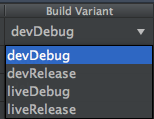Creating BuildVariants with Gradle

Creating multiple versions of the app – what can be done?
When creating an application, sometimes, at some point, we want to get several versions of our application that differ in some more or less important details. To easily obtain different versions of your application, just make a few changes in Gradle.
BuildTypes
When creating a project in AndroidStudio in Gradle, we have 2 default BuildTypes: debug and release. These types refer to a number of settings for building a project. It is also a good place to define things, e.g. location and name of generated builds:
buildTypes {
release {
applicationVariants.all { variant ->
variant.outputs.each { output ->
def file = output.outputFile
output.outputFile = new File(file.parent, "releaseBuildHeader" + defaultConfig.versionName + ".apk")
}
}
}
debug { (...) }
}ProductFlavors
ProductFlavors, in turn, allows us to define the parameters used in the application code, for example, we can distinguish between minSdkVersion. The example below shows how to differentiate between versions using various URL addresses to the API, of which one requires a certificate, and the other does not:
productFlavors {
live {
applicationId 'pl.holdapp.testapp'
buildConfigField 'String', 'API_URL', '"https://some-api-url.com"'
buildConfigField 'boolean', 'NEED_CERTIFICATE', "false"
}
dev {
applicationId 'pl.holdapp.testapp.dev'
buildConfigField 'String', 'API_URL', '"https://another-api-url.com"'
buildConfigField 'boolean', 'NEED_CERTIFICATE', "true"
}
}
As you can see, here we use buildConfigField, where we specify ‘defined constant type’, ‘name’ and ‘value’ respectively. Okay, but there’s still a question of how to use this value within our application code? As it turns out, it is just as easy. It’s enough to reference the constant in the code as follows:
if (BuildConfig.NEED_CERTIFICATE)
okHttpBuilder.sslSocketFactory((sslContext.getSocketFactory()));With BuildTypes and ProductFlavors as we set them, after synchronizing the project (introducing the changes made in Gradle), we now have four BuildVariants:

As a result, we can freely switch between variants to create the right version of an application with basically no workload. This is a very practical and helpful solution that can save you a lot of valuable developer time.







